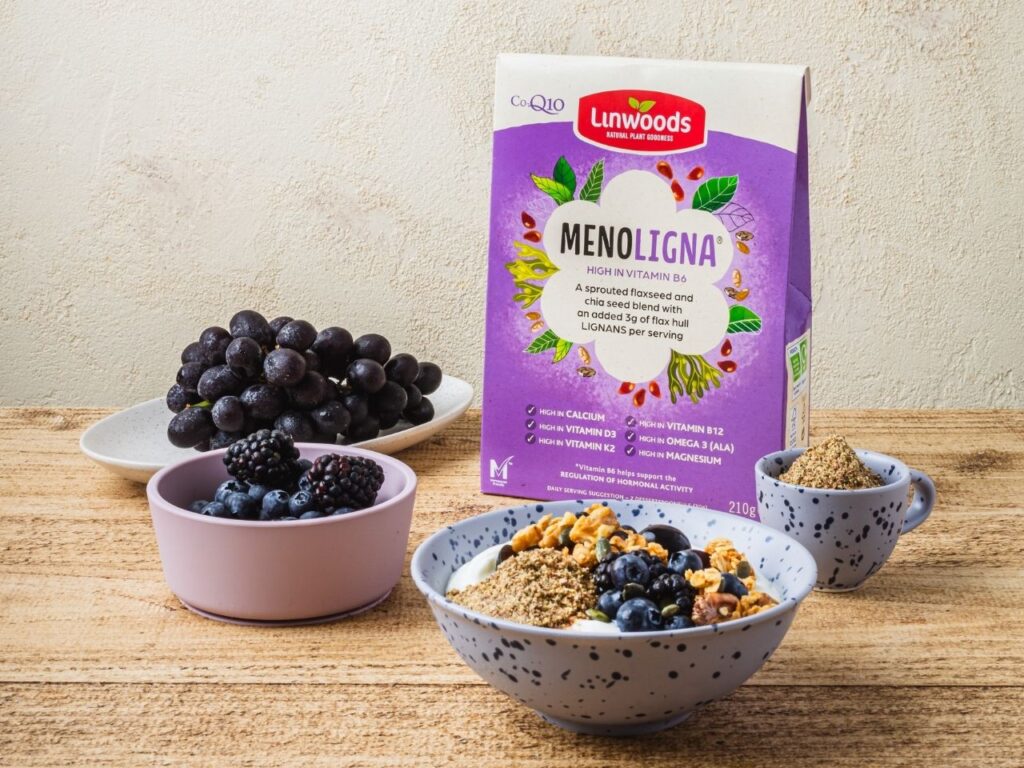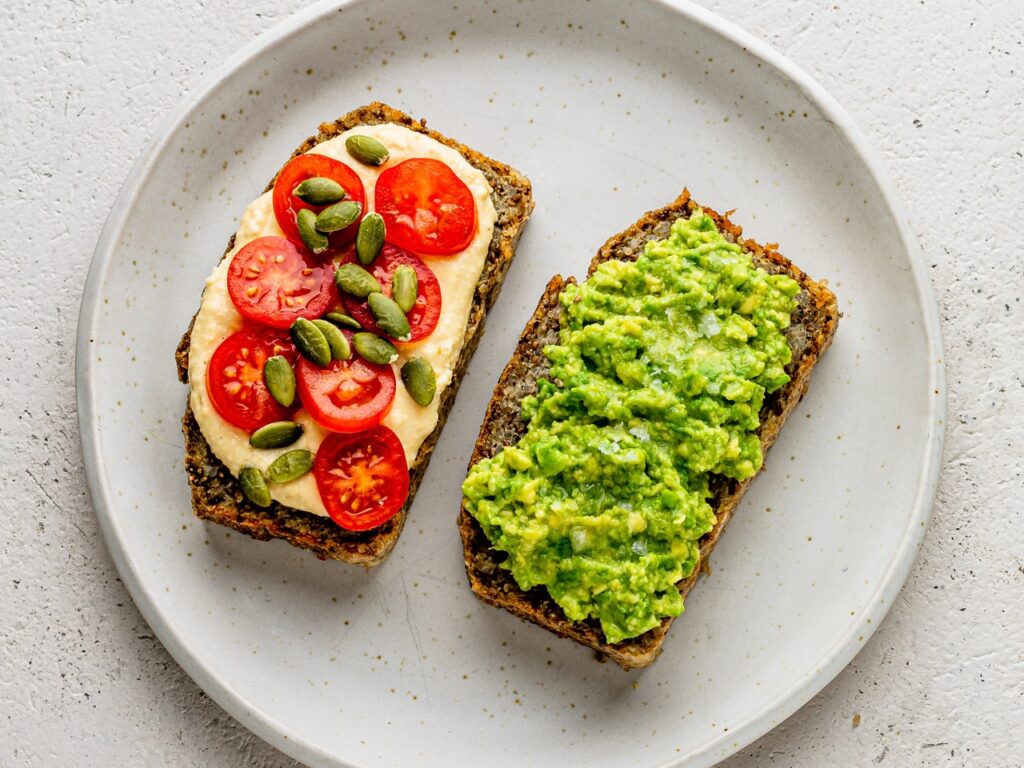If you’re in your late 30s or 40s and noticing you’re more forgetful, struggling to focus or constantly losing your train of thought, you’re not alone. Brain fog is one of the most common (and frustrating) symptoms of perimenopause.
Unlike a medical diagnosis, brain fog is a term used to describe a group of cognitive symptoms that can make you feel mentally fuzzy, forgetful and slow. You might find it harder to concentrate, process information or recall words and names. These changes are often subtle at first but can become more disruptive over time.

Worried Perimenopause Brain Fog Could Be Something More Serious?
A common worry is whether brain fog is an early sign of dementia—but the two are very different. While perimenopause brain fog can be distressing, it doesn’t indicate permanent cognitive decline. In most cases, it’s temporary and hormone-related.
In fact, up to 60% of midlife women report cognitive symptoms during the menopause transition—including forgetfulness, difficulty concentrating and feeling mentally fuzzy. Dementia, on the other hand, typically involves progressive memory loss that significantly impacts daily life.
Perimenopausal brain fog tends to fluctuate—often tied to your cycle, sleep quality and stress levels—and usually improves over time. If you’re ever concerned about your symptoms, speak with your GP. But for most women, these cognitive changes are a normal response to hormonal shifts, not a sign of something more serious.
How Hormones Affect Your Brain in Perimenopause
Oestrogen isn’t just a reproductive hormone—it plays a vital role in brain function, influencing memory, focus and even mood. As oestrogen levels fluctuate and decline in perimenopause, it can impact neurotransmitters like serotonin, dopamine and acetylcholine—all of which are key to cognitive health.
Low progesterone can also contribute by affecting sleep quality and increasing feelings of anxiety or restlessness, which further cloud the mind.
When to Expect Perimenopause Brain Fog—and When It Usually Improves
Brain fog can start in the early stages of perimenopause, which can begin in your late 30s or early 40s. It often coincides with other hormonal shifts such as irregular periods, mood changes or sleep disturbances.
For many women, brain fog improves after menopause when hormones settle into a new rhythm—but this varies. In the meantime, nutrition and lifestyle changes can make a noticeable difference.
Top 10 Nutrients & Foods to Improve Perimenopause Brain Fog Naturally
Nutrition is a cornerstone of reducing brain fog—and the right foods have the power to improve cognitive function. Certain nutrients play a key role in brain function, and including them in your diet consistently can support memory, focus and overall mental clarity.
1. Omega-3 Fatty Acids (DHA & EPA) – Support brain cell communication, reduce inflammation and support hormone production
Omega-3 fatty acids are essential for brain health, especially during perimenopause when hormonal fluctuations can contribute to cognitive symptoms like brain fog, forgetfulness and mental fatigue. The active forms—DHA (docosahexaenoic acid) and EPA (eicosapentaenoic acid)—help reduce inflammation and maintain healthy brain cell membranes.
While plant-based omega-3s (ALA, or alpha-linolenic acid) can convert into DHA and EPA, this process is inefficient.
Best food sources of omega-3s to support brain health:
- Salmon – An excellent source of DHA and EPA, which directly support brain health, reduce inflammation and provide vitamin D and zinc
- Rainbow trout – Rich in DHA and EPA, comparable to salmon, and often more sustainable and milder in flavour
- Mackerel, sardines and anchovies – These oily fish are not only rich in omega-3s but also provide zinc and vitamin D
- Flaxseeds and chia seeds – Plant-based sources of ALA (alpha-linolenic acid), which the body can partially convert to EPA and DHA
For optimal brain health in perimenopause, prioritise oily fish that provide preformed DHA and EPA, along with other key nutrients like vitamin D and zinc.

2. B Vitamins (B6, B12, Folate) – Support energy production and brain function
B vitamins are essential for converting food into energy and supporting the nervous system. Vitamins B6, B12 and folate are particularly important for brain function, mood regulation and memory. They are water-soluble, which means your body doesn’t store them—so it’s important to include vitamin B-rich foods in your diet every day to maintain optimal levels. Deficiencies are common and can contribute to fatigue, low mood and cognitive fog.
Vitamin B12 is found exclusively in animal products, so if you follow a plant-based diet, it’s important to supplement to avoid deficiency. Liver is one of the richest natural sources of B vitamins and animal-based sources tend to be more bioavailable, meaning they are more easily absorbed and utilised by the body.
Best food sources of B vitamins to support brain health:
- Liver – Exceptionally high in B vitamins, especially B12 and folate
- Meat, poultry and fish – Excellent sources of B12 and B6
- Eggs – Provide B12 and choline for brain development and function
- Leafy greens – Rich in folate, which supports memory and mood
- Legumes – A good plant-based source of folate and B6
- Wholegrains – Provide a mix of B vitamins, but absorption can be limited; best paired with other sources
If you’re vegan or vegetarian, consider a vitamin B12 supplement to ensure adequate intake. Choose one that contains both methylcobalamin and adenosylcobalamin—the active forms best absorbed and used by the body.
3. Choline – Crucial for memory, focus and brain development
Choline is a key nutrient for brain health and one of the building blocks of acetylcholine—a neurotransmitter involved in memory and learning. It also supports liver health and hormone metabolism, making it especially important during perimenopause. Choline is considered a ‘cousin’ of the B vitamin family and works synergistically with other B vitamins to support cognitive function and nervous system health—so it’s best to get choline from food wherever possible.
Best food sources of choline to support brain health:
- Eggs – One of the best dietary sources of choline, especially the yolk. One large egg provides ~147 mg choline, around 30% of your daily needs
- Liver – Extremely rich in choline (a typical 85g portion provides 350–420 mg), along with B12 and folate
- Meat and fish – Provide moderate amounts of bioavailable choline
- Tofu – Contains some choline (~35–50 mg per 125g or ½ cup)
- Edamame – A practical plant-based source, offering ~50–60 mg per 80g (½ cup) cooked
The adequate daily intake (AI) for women is 425 mg of choline—so it’s important to include a variety of choline-rich foods daily, especially during perimenopause. If you’re vegetarian, focus on eggs as your primary source of choline. If you’re following a fully plant-based diet, consider supplementing with phosphatidylcholine, as plant sources generally don’t provide meaningful amounts for optimal brain support. For example, to meet your daily choline needs from tofu alone, you’d need to eat over 1kg per day.

4. Magnesium – Supports relaxation, sleep and the stress response
Magnesium plays a key role in nervous system regulation, muscle relaxation and sleep quality. It also helps manage stress by supporting the HPA axis (your brain–adrenal connection), which can reduce the intensity of brain fog symptoms.
Best food sources of magnesium to support brain health:
- Halibut – A mild, nutrient-rich fish which is one of the best animal-based sources of magnesium, also high in protein
- Dark leafy greens (like spinach and Swiss chard) – Deliver magnesium alongside folate and antioxidants
- Pumpkin seeds – A top plant-based source, also providing zinc
- Almonds – Offer magnesium and healthy fats for hormone support
- Dark chocolate (70%+ cocoa) – Provides magnesium and polyphenols that reduce inflammation, including flavonoids to support mood
Magnesium glycinate is a gentle, well-absorbed form if considering supplements.
5. Vitamin D – Supports mood, memory and cognitive health
Often called the “sunshine vitamin”, vitamin D is involved in brain function, immune support and hormone balance. Deficiency is common in the UK and linked to mood swings, low energy and increased brain fog.
Vitamin D is unique in that it’s the only vitamin the body can make from sunlight exposure. It is a fat-soluble vitamin, meaning it can be stored in the body for later use. If you get enough sun exposure in the summer months, it may help maintain your levels through part of the winter. However, in the UK, UVB rays aren’t strong enough from October to March, so dietary sources and supplementation become essential.
There are two forms of vitamin D:
- Vitamin D3 (cholecalciferol) – Found in animal-based foods like oily fish, eggs, liver and meat. It’s more bioavailable and more effective at raising vitamin D levels.
- Vitamin D2 (ergocalciferol) – Found in some UV-exposed mushrooms, but you’d need to eat around 2.2kg per day to meet the UK RNI of 10µg (400 IU)—making them an impractical source.
Best food sources of vitamin D to support brain health:
- Oily fish – Such as salmon, mackerel, anchovies, sardines and rainbow trout; excellent sources of vitamin D3 and omega-3s
- Egg yolks – Contain vitamin D3, especially in pasture-raised hens, and also provide choline and B12
- Liver and meat – Natural sources of vitamin D3 that support overall nutrient status, including iron and B vitamins
A daily supplement of vitamin D3 + K2 may be beneficial, especially in winter or if you follow a plant-based diet. It’s a good idea to test your vitamin D levels before supplementing—especially if you follow a plant-based diet or have limited sun exposure—to determine whether you need additional support and at what dose.

6. Antioxidants – Protect brain cells from oxidative stress
Antioxidants help neutralise free radicals, which can damage brain cells and contribute to inflammation—two key factors in brain fog. A diet rich in colourful plant foods supports mental clarity and long-term cognitive health.
Key antioxidants include:
- Vitamin C – Regenerates other antioxidants and supports neurotransmitter production
- Vitamin E – Protects cell membranes from oxidative damage
- Polyphenols – Found in brightly coloured fruits, vegetables, herbs and spices; support anti-inflammatory pathways in the brain
- Lutein and zeaxanthin – Carotenoids that accumulate in the brain and protect against cognitive ageing
- Resveratrol – A polyphenol found in grapes and berries that supports circulation and may protect memory function
Best food sources of antioxidants to support brain health:
- Berries – Blueberries, strawberries and raspberries are especially powerful and rich in vitamin C and polyphenols
- Spinach and kale – Provide lutein, zeaxanthin and other brain-protective compounds
- Peppers and red cabbage – Rich in vitamin C and polyphenols that combat oxidative stress
- Purple grapes – Contain resveratrol, which supports circulation and brain function
- Nuts and seeds – Such as sunflower seeds and almonds, which are rich in vitamin E
- Herbs and spices – Including turmeric, rosemary and cinnamon, known for their high polyphenol content
Aim to eat the rainbow daily—each colour brings its own brain-boosting antioxidant benefits.
7. Zinc – Supports neurotransmitter function and brain signalling
Zinc is a trace mineral that supports neurotransmitter activity, immune health and hormone regulation. Low levels of zinc have been associated with poor memory and slower cognitive processing.
Best food sources of zinc to support brain health:
- Pumpkin seeds – A versatile source also rich in magnesium
- Shellfish – Especially oysters, which provide around 39 mg of zinc per 100g (over 3x the RNI for women). Prawns are a more practical option, offering ~1.5 mg per 100g
- Beef and lamb – Animal sources with excellent absorption
- Chickpeas, cashews and almonds – Provide small amounts of zinc, but absorption is limited due to phytates. You may only absorb 10–25% of the zinc from these foods compared to 40–60% from animal sources. You’d need to eat large portions (and significant calories) to meet your needs from plant-based options alone.
Zinc also supports the immune system, which may play a role in brain fog during hormonal shifts.

8. Iron – Helps deliver oxygen to the brain and reduce fatigue
Iron is essential for transporting oxygen in the blood. When levels are low, it can lead to brain fog, fatigue and poor concentration—symptoms commonly experienced during perimenopause. Women may be especially vulnerable to iron deficiency in this phase due to irregular or heavy periods.
Iron from animal foods (haem iron) is significantly more bioavailable than non-haem iron from plant sources, meaning it’s better absorbed and utilised by the body. The UK RNI for iron is 14.8 mg per day for women aged 19–50, reflecting increased needs due to menstruation. After menopause, this drops to 8.7 mg per day.
Note – These figures are based on average requirements to prevent deficiency in healthy individuals, but individual needs can vary—especially with heavy periods, low ferritin, or digestive issues that impair absorption.
Best food sources of iron to support brain health (per cooked portion):
- Liver – 100g (e.g. chicken liver)
~9 mg of haem iron – an exceptionally rich source, providing over 60% of the RNI for menstruating women. - Beef – 100g (average serving of mince or steak)
~2.6–3 mg of haem iron – highly bioavailable and widely consumed - Chicken thigh – 100g (e.g. 2 small thighs, skinless)
~1.3 mg of haem iron – less than beef but still a good source, particularly for those eating less red meat - Oily fish – 100g (e.g. sardines, mackerel, salmon)
~0.7–1.7 mg of haem iron – plus a source of omega-3s and vitamin D - Tofu (firm) – 126g (½ cup)
~3 mg of non-haem iron – more accessible in calcium-set tofu - Tempeh – 85g (½ cup)
~2.2 mg of non-haem iron – also provides gut-friendly fermented soy - Lentils – 200g (1 cup cooked)
~3.3 mg of non-haem iron – commonly cited but absorption is limited - Chickpeas – 200g (1 cup cooked)
~4.7 mg of non-haem iron – generous for a plant-based source - Spinach – 180g (1 cup cooked)
~6.4 mg, but poorly absorbed due to oxalates
Iron from animal foods (haem iron) is significantly more bioavailable than from plant sources. You may absorb only 10–25% of the iron from plant-based foods, compared to 40–60% from meat and fish. Pair plant-based iron sources with vitamin C-rich foods to boost absorption. If you follow a plant-based diet or struggle with iron levels, consider using a Lucky Iron Fish—a simple tool you can cook with to naturally enrich your food with iron.
9. Vitamin C – Enhances antioxidant protection and iron absorption
Vitamin C plays several important roles in supporting brain health—especially during perimenopause. It helps regenerate other antioxidants like vitamin E, supports the production of neurotransmitters (such as dopamine and serotonin), and contributes to a healthy stress response via the adrenal glands.
It’s also key for improving the absorption of non-haem iron from plant-based foods. Pairing vitamin C-rich foods with iron-rich meals can help increase iron uptake and reduce the risk of deficiency—something many women in perimenopause are vulnerable to due to heavy periods.
Best food sources of vitamin C to support brain health (per 100g):
- Red bell peppers – Around 190 mg; one of the highest natural sources
- Kiwi fruit – Packs in ~93 mg—more than an orange!
- Oranges – Contain ~53 mg, plus fibre and hydration
- Strawberries – Offer ~59 mg and a sweet antioxidant boost
- Broccoli (cooked) – Delivers ~65 mg and is also rich in sulforaphane for detox support
- Brussels sprouts (cooked) – Around 85 mg; a cruciferous powerhouse
- Lemon juice (1 whole lemon) – ~30–35 mg; ideal for enhancing iron absorption when squeezed over veg, grains or pulses
Aim for a variety of colourful fruits and vegetables each day to keep vitamin C levels topped up—your body can’t store it, so regular intake (daily) is key.

10. Phytoestrogens – Help modulate hormone fluctuations that affect brain function
Phytoestrogens are plant compounds that mimic oestrogen in the body and may help stabilise hormone fluctuations during perimenopause. By gently supporting hormonal balance, they may reduce symptoms like brain fog, forgetfulness and mental fatigue.
There are two main types of phytoestrogens:
- Lignans – Found in seeds (especially flax and sesame), wholegrains and some fruit and vegetables. Lignans are converted by gut bacteria into compounds with weak oestrogenic activity.
- Isoflavones – Found primarily in soy-based foods. Isoflavones are structurally similar to oestrogen and can bind to oestrogen receptors, with the potential to support cognitive and hormonal health.
Best food sources of phytoestrogens to support brain health:
- Flaxseeds – One of the richest sources of lignans and also provide fibre
- Tofu and tempeh – Fermented soy foods rich in isoflavones with better bioavailability
- Miso and tamari – Traditional fermented soy products that support gut health
- Sesame seeds and tahini – Contain lignans and healthy fats
- Chickpeas and lentils – Modest sources of phytoestrogens that also offer fibre and folate
Regularly including a variety of phytoestrogen-rich foods may help ease brain fog symptoms naturally and gently support hormone balance during perimenopause.

Top 5 Foods to Avoid for Brain Clarity in Perimenopause
While nutrient-rich foods can help improve focus and cognitive function, some foods may contribute to brain fog, sluggishness, low mood or mental fatigue—especially during perimenopause, when hormone fluctuations can already challenge your clarity and energy.
Here’s what to reduce or avoid to better support your brain:
1. Refined sugar and white carbohydrates
These foods cause rapid spikes in blood glucose followed by crashes, which can lead to low energy, poor concentration and irritability. Regular consumption can also drive insulin resistance and inflammation—both of which affect cognitive function over time.
Common sources: Sweets, pastries, white bread, commercial gluten-free bread, white pasta, breakfast cereals, grain-based (and usually high-sugar) granolas, and fruit juice.
Choose these brain-friendly alternatives instead:
- Swap white bread for wholegrain or rye sourdough, or dense nut and seed loaves. Avoid most packaged gluten-free breads, which are often ultra-processed and high in starches and additives that can worsen blood sugar balance and brain fog. Also steer clear of supermarket “sourdough-style” loaves with long ingredient lists—real sourdough supports better blood sugar balance and digestion.
- Replace white pasta with wholegrain or legume-based versions for more fibre and sustained energy
- Ditch sugary cereals for overnight oats or chia pudding with berries and seeds
- Make your own granola using nuts, seeds and a touch of cinnamon instead of pre-sweetened blends
- Skip fruit juice and sip on infused water with mint, cucumber or citrus
- Satisfy sweet cravings with dark chocolate (70%+), berries or baked apples with cinnamon

2. Ultra-processed foods
Highly processed foods are often loaded with additives, damaged seed oils, trans fats (hydrogenated vegetable oils), refined grains and hidden sugars, which may disrupt gut health and drive systemic inflammation—a known contributor to brain fog. They also tend to be nutrient-poor, displacing the whole foods your brain needs to thrive.
Examples include: crisps, ready meals, sweetened yoghurts, soft drinks flavoured snacks, margarine, spreadable butters and ultra-processed meats (reconstituted meat products such as hot dogs and chicken nuggets, deli slices like ham and turkey, and meat spreads).
Choose instead: Healthy fats such as extra virgin olive oil, avocado oil, coconut oil, organic butter or ghee. For protein, opt for minimally processed meats like roast chicken, slow-cooked beef or leftover home-cooked options. When shopping for bacon or sausages, choose nitrate-free options made from outdoor-reared pork and check the label for a short list of recognisable ingredients.
Tip: If you’re avoiding gluten, be sure to check that sausages are labelled gluten-free, as many contain wheat-based fillers.
3. Alcohol
Even small amounts can affect neurotransmitter function, worsen sleep quality and reduce REM sleep—essential for memory consolidation. It can also deplete nutrients critical for brain health like B vitamins, magnesium and zinc, which are already in high demand during perimenopause.
Try this instead: Swap wine or cocktails for a glass of sparkling water with electrolytes and fresh lime, a refreshing kombucha, or try my Nojito—an alcohol-free mojito, perfect for a brain-friendly boost.
Tip: If you do drink, opt for low-sugar options and keep it occasional.

4. Caffeine (in excess)
While small amounts can be mentally stimulating, too much caffeine—especially in the afternoon—can worsen anxiety, disrupt sleep and overstimulate the nervous system. Poor sleep and stress exacerbate brain fog.
Recommendation: Limit to 1–2 cups before midday and avoid energy drinks altogether.
5. Foods you’re intolerant to
Unidentified food intolerances can drive chronic low-grade inflammation and affect gut-brain signalling, which plays a major role in cognitive function. If brain fog worsens after eating certain foods, consider keeping a food and symptom diary to identify patterns.
Common triggers: gluten, dairy, eggs, soy and certain food additives.
It’s also common to develop new intolerances during perimenopause—even to foods you’ve eaten for years without issue. Hormonal changes can affect gut health and immune response, making you more reactive. Gluten and dairy are two of the most frequent culprits, especially if symptoms like bloating, fatigue, skin issues or brain fog appear after eating them.

Top 5 Supplements for Perimenopause Brain Fog
While food should always be the foundation of your perimenopause brain health strategy, supplements can offer valuable support—especially if your diet is lacking key nutrients, your absorption is compromised (which is common in perimenopause), or you want to target specific symptoms like brain fog, poor sleep or low mood.
Here are some of the most researched and practical options:
1. Omega-3 (EPA & DHA)
These essential fatty acids help reduce inflammation, support brain cell structure and improve neurotransmitter signalling. Supplementing with a high-quality fish oil can be especially helpful if you don’t regularly eat oily fish (2–3 times per week).
Tip: Choose a supplement that provides at least 500–1000 mg combined EPA and DHA per day from a reputable brand.
2. B-complex
A well-formulated B-complex includes B6, B12 and folate, which are essential for energy production, nerve signalling and neurotransmitter synthesis. B vitamins are water-soluble and quickly depleted by stress—making them especially important in perimenopause.
Ideal if: You’re very stressed, mentally exhausted or feeling low in energy
Also recommended for: Vegans, vegetarians or those with digestive issues that affect absorption
Supplement tip: Look for activated forms like methylcobalamin (B12) and methylfolate for better absorption. Take B vitamins in the morning, especially if they contain methylated (activated) forms, as they can be mentally stimulating.
3. Magnesium glycinate
Magnesium is crucial for calming the nervous system, improving sleep quality and supporting cognitive function. The glycinate form is gentle on the stomach and well absorbed, making it ideal for reducing stress, irritability and poor focus.
Bonus: Also supports muscle relaxation, headaches and hormone metabolism.
Tip: Take it in the evening before bed to enhance relaxation and support a restful night’s sleep.
4. Vitamin D3 + K2
Vitamin D is involved in mood regulation, cognitive performance and immune health — all of which can influence brain fog. K2 works synergistically with D3 to help regulate calcium, which supports not only bone and heart health, but also healthy circulation — important for delivering oxygen and nutrients to the brain.
Many women in the UK are low in vitamin D, especially in the winter months when sunlight is limited.
Supplement tip: Choose vitamin D3 (cholecalciferol) paired with vitamin K2 (MK-7) for better absorption and effectiveness.
5. Adaptogens
Lion’s Mane Mushroom
Lion’s mane is a powerful natural nootropic (brain-boosting compound) that supports neurogenesis—the growth of new brain cells—and may enhance memory, focus and mental sharpness. It’s especially helpful during perimenopause, when cognitive symptoms like forgetfulness and mental fatigue are common.
Forms: Available in powders, capsules or tinctures. Look for a high-quality product made from the whole fruiting body and grown on a natural substrate. While some brands promote dual-extracts, there’s no strong evidence they’re superior to whole mushroom powders. Ultimately, quality and growing conditions matter most.

Rhodiola or ashwagandha
These traditional adaptogens help regulate the body’s stress response and support nervous system balance—both vital for reducing perimenopause brain fog.
- Rhodiola rosea – May improve concentration, reduce mental fatigue and enhance resilience under stress.
- Ashwagandha – Calming and grounding, it supports healthy cortisol levels and restful sleep, which are essential for cognitive clarity.
Tip: Start with just one adaptogen and take it for a cycle of 6–8 weeks, then pause for 1–2 weeks to assess how you feel. Always choose a high-quality, standardised extract. If you’re taking HRT or any medication, check with your doctor or healthcare provider for potential interactions.
5 Lifestyle Strategies to Help Reduce Perimenopause Brain Fog
Your brain thrives on more than just food and supplements—your daily habits and environment play a powerful role in cognitive clarity. During perimenopause, supporting your nervous system, stress levels and sleep patterns can significantly reduce brain fog.
Here are five simple yet impactful shifts to help you stay sharp and mentally energised:
1. Prioritise sleep
Aim for 7–9 hours of restorative sleep each night, with consistent bed and wake times—even on weekends. Sleep is essential for memory consolidation, hormone regulation and clearing toxins from the brain.
Create a calming wind-down routine and limit screen time before bed.

2. Move daily
Regular movement increases blood flow to the brain, supports neurotransmitter function and helps regulate hormones.
A mix of strength training, aerobic activity and low-impact movement like walking or yoga is ideal for brain and body health.
3. Manage stress
Chronic stress can shrink the hippocampus (the brain’s memory centre) and worsen cognitive function.
Incorporate daily stress-relief practices such as meditation, breathwork, journalling, walking in nature, or simply pausing for quiet reflection.

4. Stay mentally active
Just like your muscles, your brain benefits from regular use and challenge.
Read books, learn a language or new skill, do puzzles, or play a musical instrument to keep your neural pathways firing.
5. Stay social
Human connection stimulates the brain and supports emotional wellbeing.
Even short chats with friends, family or a community group can enhance mood and memory.

Frequently Asked Questions About Perimenopause Brain Fog
Got questions? You’re not alone. Brain fog during perimenopause can be confusing and frustrating, but understanding what’s going on can make all the difference. Below you’ll find answers to the most common questions about brain fog, hormones and how to feel like yourself again.
Understanding Perimenopause Brain Fog
Perimenopause brain fog refers to a cluster of cognitive symptoms that often emerge during the menopause transition. These include forgetfulness, difficulty concentrating, mental fatigue and a general sense of being mentally “cloudy.” It’s caused by hormonal fluctuations that impact brain function.
Brain fog typically begins during perimenopause, often in your 40s, and may continue until after menopause. For most women, symptoms improve as hormone levels stabilise post-menopause, though some may experience lingering effects. Lifestyle and nutrition can help manage symptoms at any stage.
Oestrogen supports brain function by helping neurons use glucose for energy and protecting against oxidative stress. During perimenopause, fluctuating oestrogen can disrupt this support, leading to brain fog. Progesterone and testosterone also influence mood, memory and sleep, adding to the impact.
Common Perimenopause Brain Fog Concerns & Symptoms
While brain fog can feel alarming, it’s usually temporary and related to hormone changes—not a sign of dementia. If symptoms came on suddenly or coincide with other perimenopausal changes, they’re likely due to fluctuating oestrogen and progesterone. If you’re ever unsure or concerned, speak to your GP.
Common symptoms include:
Difficulty concentrating
Short-term memory lapses
Losing your train of thought
Struggling to find words
Feeling mentally drained
These symptoms often come and go depending on stress, sleep, cycle stage and other lifestyle factors.
Brain fog can sometimes mimic more serious neurological conditions, which can be worrying. It’s common to confuse perimenopause brain fog with early signs of dementia or ADHD, especially when memory lapses or concentration issues become more noticeable. However, perimenopause-related cognitive changes are usually temporary and linked to fluctuating hormones. If symptoms are persistent, worsening, or affecting daily life, it’s important to speak to your GP for reassurance and to rule out other causes like thyroid issues, low B12 or iron deficiency.
How to Relieve Perimenopause Brain Fog Naturally
Supporting your brain with targeted nutrition, balanced meals, regular movement, good sleep and stress management can all help. Supplements like omega-3s, B-vitamins and magnesium may also offer support. Consistency is key—it’s small, daily choices that make a lasting impact.
Focus on:
Oily fish like salmon and sardines for omega-3s
Leafy greens and wholegrains for B vitamins
Nuts, seeds and extra virgin olive oil for healthy fats
Colourful veg and berries for antioxidants
Fermented soy, flaxseeds and sesame for phytoestrogens
These foods nourish your brain and help regulate hormones.
Some of the most effective supplements for supporting brain clarity include:
Omega-3 (EPA/DHA)
B-complex vitamins
Magnesium glycinate
Vitamin D3 + K2
Lion’s Mane mushroom
Adaptogens like rhodiola and ashwagandha
Lifestyle plays a major role in how brain fog shows up—and how quickly it improves. Poor sleep, high stress, lack of movement and excessive screen time can all make symptoms worse. On the other hand, prioritising restorative sleep, regular physical activity, time outdoors, and stress-reducing practices like meditation or journalling can significantly improve mental clarity. Consistency is key: small daily changes create long-term impact.
Key takeaways on Perimenopause Brain Fog
- Perimenopause brain fog is common and caused by hormonal shifts—especially oestrogen and progesterone changes.
- It’s usually temporary and manageable, not a sign of dementia.
- Food and lifestyle matter—nutrients like omega-3s, B vitamins and magnesium can support clarity and focus.
- Reducing sugar, ultra-processed foods, alcohol and stress and improving sleep can also help.
- Consider targeted supplements and simple lifestyle changes to feel more clear-headed and energised.
Final Thoughts on Using Nutrition and Lifestyle to Improve Perimenopause Brain Fog
If you’re feeling forgetful, foggy or not quite yourself mentally, know that you’re not alone—and there is support. Perimenopause brain fog is common, but it doesn’t have to define your experience.
By making targeted nutrition and lifestyle changes, you can nourish your brain, support hormonal balance and feel more like yourself again. From prioritising nutrient-dense foods and smart supplements to improving sleep, managing stress and staying connected, every small shift makes a difference.
With the right support, you can navigate perimenopause with greater clarity, focus and confidence.